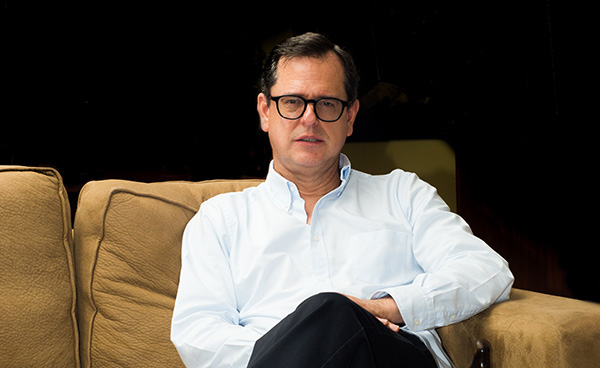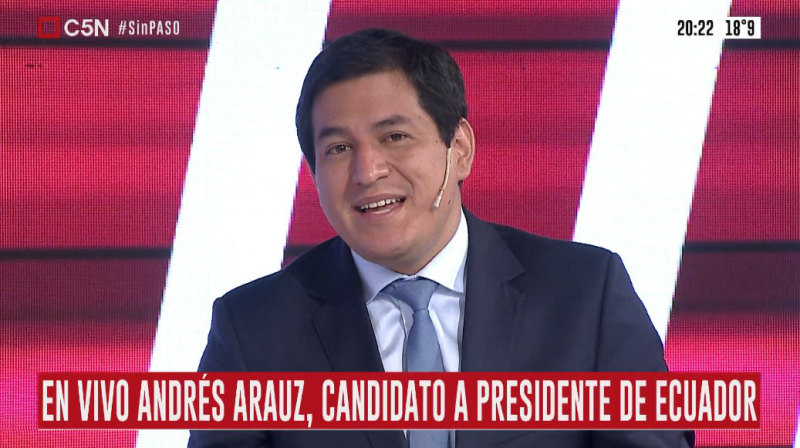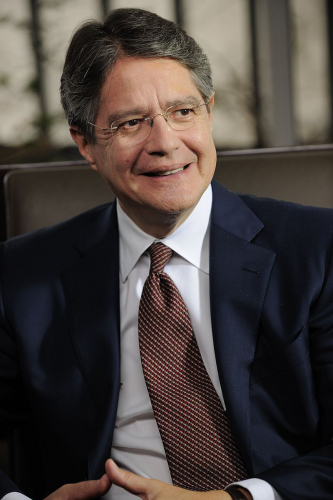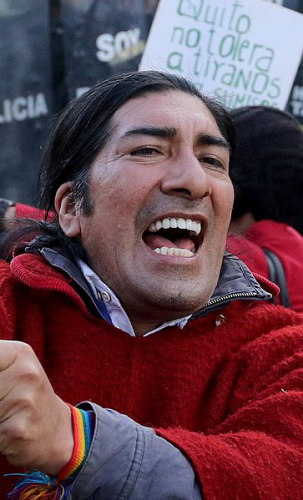From the Open-Publishing Calendar
From the Open-Publishing Newswire
Indybay Feature
Ecuador's Democracy Threatened by Efforts to Exclude Popular Presidential Candidate Andrés Arauz
“It is important to understand the goals of the current government in regards to the election. First, they want to stop our presidential ticket from being on the ballot...removing us from the ballot would set a disastrous precedent for all of our Americas,” said Andres Arauz, leading candidate for President of the Union for Hope.
Photo credit: @ecuarauz Twitter
Photo credit: @ecuarauz Twitter
QUITO, ECUADOR – Efforts to exclude the leading opposition ticket from Ecuador's presidential election continue. The Contentious Electoral Tribunal (TCE) of Ecuador decided on November 29th to deny final certification of the ticket. The TCE ordered the the National Electoral Council (CNE) to review charges against Andrés Arauz for President and Carlos Rabascall for Vice-President of the Unión Por La Esperanza (UNES “Union for Hope”) and possibly exclude them from the election.
Arauz has consistently polled as one of the top two candidates to either win the election scheduled for February 7, 2021, or to be involved in a presidential runoff to be held April 12, 2021, if needed.
UNES is the most popular left/progressive electoral alliance in Ecuador and is allied with the former President of Ecuador, Rafael Correa. If allowed to compete in the election, Arauz and UNES stand a good chance of winning.
“Ecuador is currently going through a coup attempt against our democracy. This coup attempt is currently underway and we must put a stop to it,” charged Arauz at a press conference.
“It is important to understand the goals of the current government in regards to the election. First, they want to stop our presidential ticket from being on the ballot...removing us from the ballot would set a disastrous precedent for all of our Americas,” argued Arauz.
Arauz also charged that the government is working secretly behind the scenes to delay the elections. “Another goal the government has is to postpone the elections.”
According to a report by the newspaper El Universal, Arauz claimed that the government had already made presentations to the international community which provide rationale for a postponement of the elections and that the some members of the CNE were secretly preparing a new election calendar and talking points to justify it.
Arauz and UNES have called for international support to protect their right to run in the elections. The President of Argentina Alberto Fernandez tweeted, "Democracy is not built by excluding political actors. That is what happens with Andrés Arauz in Ecuador, whose registration as a presidential candidate is delayed for no reason." "We must guarantee that in Latin America the rule of law functions fully," wrote Fernandez. A document calling on Arauz and UNES to be included in the elections has been signed by former Latin American Presidents Lula Da Silva, Fernando Lugo, José Mujica, Tabaré Vásquez, and Evo Morales, according to a report by La Republica.
Ecuador's establishment has rallied behind the candidacy of Guillermo Lasso, a banker, who is being fielded by an alliance of Ecuador's two largest right-wing parties. Lasso came close to winning the presidency in 2017, narrowly losing to current President Lenín Moreno, who is not seeking re-election. There is apparently growing concern among the establishment that Lasso may not be able to beat Arauz. Polls have consistently shown the two candidates in a tight race. (https://es.wikipedia.org/wiki/Anexo:Sondeos_de_intenci%C3%B3n_de_voto_para_las_elecciones_generales_de_Ecuador_de_2021 )
Establishment election concerns appear to have increased since the elections in nearby Bolivia in which Luis Arce and the Movement Towards Socialism party won a big victory. Polls had predicted a second round runoff in Bolivia and a close election, but Arce easily won in the first round by twenty-five percentage points.
There is concern that polling in Ecuador, which is currently predicting a close election and a runoff between Arauz and Lasso, may be as wildly inaccurate as it was in Bolivia. In question is whether corporate polling organizations accurately poll the poor who constitute the great majority in Ecuador, as they do in Bolivia. Many Arauz supporters are incredulous of the polls and expecting Arauz to win in the first round, if he is allowed to compete.
There has been no coverage of these developments in Ecuador by any corporate media outlet in the English language anywhere in the world. If the same thing happened in Venezuela (the attempt to eliminate the leading opposition party), every major English language corporate media outlet worldwide would report it immediately. However, because it is happening in Ecuador, a government currently aligned with the United States and major Western European powers, and because it is happening to a party on the political left, there is a news blackout.
The charges against the Arauz-Rabascall ticket and UNES were filed by two individuals, Carlos Arboleda, former energy minister in the government of former President Lucio Gutiérrez, and Wilson Freire, however, it is widely assumed that they are acting on behalf of Ecuador's establishment. The substance of their argument for the exclusion of Arauz are entirely technical, procedural, and arcane.
In Ecuador, a registered and recognized political party can form an alliance with another one and jointly present candidates in an election. Two electoral parties united to form UNES for this election. Abroleda and Freire argue that one of the parties, Fuerza Compromiso Social ( FCS “Social Commitment Force”), was not properly registered at the time the CNE recognized UNES as an official election alliance. The CNE already took up the question of the registration of FCS and decided on October 1st that FCS did qualify as an officially recognized party. Now the CNE has been ordered to reconsider the decision.
Critics charge that the attempt to disqualify FCS is fundamentally politically motivated. More than 200 political parties are recognized in tiny Ecuador (Actually more than 280 political parties are officially recognized.) In regional elections held in March, 2019, FCS proved to be one of the most popular parties, including winning the Prefect of Pinchincha Province, where Ecuador's capitol Quito is located.
That one of the most popular parties, if not the most popular one, could be disqualified while literally hundreds of much less popular parties are qualified to compete in elections is in itself profoundly undemocratic. That such a disqualification could be on purely technical grounds (arguments about voter signatures submitted by FCS and procedural arguments about how the CNE previously decided to reinstate FCS and how that relates to the decision to recognize UNES as an official alliance) is appalling to many. To date, fifteen other presidential tickets have been given final certification to run in the election. Only the Arauz-Rabascall ticket has yet to receive final certification.
It is quite possible that the CNE will eventually rule to allow the Arauz- Rabascall ticket. Even if it does, the Arauz-Rabascall campaign has been seriously damaged by these efforts to eliminate them according to Rabascall. “Lately, when Andrés or myself are interviewed, all the questions are about the status of our presidential ticket, when for all intents and purposes we should be talking about our government plan and how our policies will help the people so we can all drag Ecuador out of this political, economic and social crisis. These are their distractions,” explained Rabascall.
The attempt to disqualify Arauz and UNES is part of a years long campaign to obstruct, impede, and discredit the largest electoral force on left, Movimiento Revolución Ciudadana (“Citizen's Revolution Movement”). First, Citizen's Revolution was repeatedly denied by the CNE in its efforts to register itself as a separate political party. After Citizen's Revolution was able to join with FCS and run candidates on that party's line, the registration of FCS began being challenged. Numerous leaders of Citizen's Revolution, including Correa, have been prosecuted and convicted on dubious corruption charges, and there have been daily propaganda attacks against Citizen's Revolution published by virtually all news outlets for almost four years. ( https://jacobinmag.com/2020/09/equador-lenin-moreno-election-2021-democracy )
The real objection that Ecuador's establishment has against Arauz is that he is an ally of former President Rafael Correa, who is also a top leader of UNES. In fact, UNES tried to get Correa registered as its candidate for Vice-President until it was forced to replace him with Rabascall. Correa and a number of allies were convicted of corruption and sentenced on April 8th to eight years in prison, and prohibited from running for any office for twenty-five years. Critics have charged that the prosecution was politically motivated, without credible evidence, and are really a type of political repression known in Latin America as “lawfare.” Correa currently lives in exile in Belgium. ( https://jacobinmag.com/2020/04/ecuador-lenin-moreno-coronavirus-rafael-correa-health-care )
To Ecuador's political and economic establishment, Rafael Correa is a bogeyman. Anything associated with him is unacceptable, because Correa is seen as a threat to their power and wealth. Correa is portrayed by them as a dangerous and corrupt socialist revolutionary. Their propaganda is that he, and anyone associated with him, will turn Ecuador into another Venezuela. In truth, Correa was a moderate reformer and his government was much less radical than that of Venezuela. While the establishment considers Correa to be tantamount to a communist dictator, he is more accurately described as a democratic socialist reformer.
Arauz is far from dangerous rabble rousing left populist the establishment would like to portray him as. He is soft spoken and more of an academic and a technocrat. He has a doctorate in Economic Finance from the National Autonomous University of Mexico and was doing further graduate studies before he decided to run for president. Arauz served in Correa's government as the Director of the Central Bank of Ecuador from 2011 to 2013. In 2015Arrauz was appointed Minister of Knowledge and Human Talent. At thirty-five years of age, Arauz is from a younger generation than Correa. His style is much less combative than Correa's. The campaign platform of Arauz and UNES has focused on recovering the country, which has been devastated by COVID-19 and a steep economic decline, rather than on building Socialism for the Twenty-first Century, as Correa did.
The central issue in the election is likely to revolve around neo-liberal economics. Lasso favors neo-liberalism including close relationships with the international capital, such as the International Monetary Fund and the World Bank; a foreign policy closely linked to that of the United States, including hostility to the government of Venezuela; an austerity budget including cuts to social services and government layoffs; and privatizing state owned industries and assets. Arauz rails against neo-liberal economics and stands for prioritizing social spending over satisfying the interests of international capital, an independent and multi-lateral foreign policy, including recognition of the government of Venezuela; reduced government layoffs; re-nationalizing privatized state businesses; with a focus on providing more assistance to the most needy Ecuadorians.
Arauz has consistently polled as one of the top two candidates to either win the election scheduled for February 7, 2021, or to be involved in a presidential runoff to be held April 12, 2021, if needed.
UNES is the most popular left/progressive electoral alliance in Ecuador and is allied with the former President of Ecuador, Rafael Correa. If allowed to compete in the election, Arauz and UNES stand a good chance of winning.
“Ecuador is currently going through a coup attempt against our democracy. This coup attempt is currently underway and we must put a stop to it,” charged Arauz at a press conference.
“It is important to understand the goals of the current government in regards to the election. First, they want to stop our presidential ticket from being on the ballot...removing us from the ballot would set a disastrous precedent for all of our Americas,” argued Arauz.
Arauz also charged that the government is working secretly behind the scenes to delay the elections. “Another goal the government has is to postpone the elections.”
According to a report by the newspaper El Universal, Arauz claimed that the government had already made presentations to the international community which provide rationale for a postponement of the elections and that the some members of the CNE were secretly preparing a new election calendar and talking points to justify it.
Arauz and UNES have called for international support to protect their right to run in the elections. The President of Argentina Alberto Fernandez tweeted, "Democracy is not built by excluding political actors. That is what happens with Andrés Arauz in Ecuador, whose registration as a presidential candidate is delayed for no reason." "We must guarantee that in Latin America the rule of law functions fully," wrote Fernandez. A document calling on Arauz and UNES to be included in the elections has been signed by former Latin American Presidents Lula Da Silva, Fernando Lugo, José Mujica, Tabaré Vásquez, and Evo Morales, according to a report by La Republica.
Ecuador's establishment has rallied behind the candidacy of Guillermo Lasso, a banker, who is being fielded by an alliance of Ecuador's two largest right-wing parties. Lasso came close to winning the presidency in 2017, narrowly losing to current President Lenín Moreno, who is not seeking re-election. There is apparently growing concern among the establishment that Lasso may not be able to beat Arauz. Polls have consistently shown the two candidates in a tight race. (https://es.wikipedia.org/wiki/Anexo:Sondeos_de_intenci%C3%B3n_de_voto_para_las_elecciones_generales_de_Ecuador_de_2021 )
Establishment election concerns appear to have increased since the elections in nearby Bolivia in which Luis Arce and the Movement Towards Socialism party won a big victory. Polls had predicted a second round runoff in Bolivia and a close election, but Arce easily won in the first round by twenty-five percentage points.
There is concern that polling in Ecuador, which is currently predicting a close election and a runoff between Arauz and Lasso, may be as wildly inaccurate as it was in Bolivia. In question is whether corporate polling organizations accurately poll the poor who constitute the great majority in Ecuador, as they do in Bolivia. Many Arauz supporters are incredulous of the polls and expecting Arauz to win in the first round, if he is allowed to compete.
There has been no coverage of these developments in Ecuador by any corporate media outlet in the English language anywhere in the world. If the same thing happened in Venezuela (the attempt to eliminate the leading opposition party), every major English language corporate media outlet worldwide would report it immediately. However, because it is happening in Ecuador, a government currently aligned with the United States and major Western European powers, and because it is happening to a party on the political left, there is a news blackout.
The charges against the Arauz-Rabascall ticket and UNES were filed by two individuals, Carlos Arboleda, former energy minister in the government of former President Lucio Gutiérrez, and Wilson Freire, however, it is widely assumed that they are acting on behalf of Ecuador's establishment. The substance of their argument for the exclusion of Arauz are entirely technical, procedural, and arcane.
In Ecuador, a registered and recognized political party can form an alliance with another one and jointly present candidates in an election. Two electoral parties united to form UNES for this election. Abroleda and Freire argue that one of the parties, Fuerza Compromiso Social ( FCS “Social Commitment Force”), was not properly registered at the time the CNE recognized UNES as an official election alliance. The CNE already took up the question of the registration of FCS and decided on October 1st that FCS did qualify as an officially recognized party. Now the CNE has been ordered to reconsider the decision.
Critics charge that the attempt to disqualify FCS is fundamentally politically motivated. More than 200 political parties are recognized in tiny Ecuador (Actually more than 280 political parties are officially recognized.) In regional elections held in March, 2019, FCS proved to be one of the most popular parties, including winning the Prefect of Pinchincha Province, where Ecuador's capitol Quito is located.
That one of the most popular parties, if not the most popular one, could be disqualified while literally hundreds of much less popular parties are qualified to compete in elections is in itself profoundly undemocratic. That such a disqualification could be on purely technical grounds (arguments about voter signatures submitted by FCS and procedural arguments about how the CNE previously decided to reinstate FCS and how that relates to the decision to recognize UNES as an official alliance) is appalling to many. To date, fifteen other presidential tickets have been given final certification to run in the election. Only the Arauz-Rabascall ticket has yet to receive final certification.
It is quite possible that the CNE will eventually rule to allow the Arauz- Rabascall ticket. Even if it does, the Arauz-Rabascall campaign has been seriously damaged by these efforts to eliminate them according to Rabascall. “Lately, when Andrés or myself are interviewed, all the questions are about the status of our presidential ticket, when for all intents and purposes we should be talking about our government plan and how our policies will help the people so we can all drag Ecuador out of this political, economic and social crisis. These are their distractions,” explained Rabascall.
The attempt to disqualify Arauz and UNES is part of a years long campaign to obstruct, impede, and discredit the largest electoral force on left, Movimiento Revolución Ciudadana (“Citizen's Revolution Movement”). First, Citizen's Revolution was repeatedly denied by the CNE in its efforts to register itself as a separate political party. After Citizen's Revolution was able to join with FCS and run candidates on that party's line, the registration of FCS began being challenged. Numerous leaders of Citizen's Revolution, including Correa, have been prosecuted and convicted on dubious corruption charges, and there have been daily propaganda attacks against Citizen's Revolution published by virtually all news outlets for almost four years. ( https://jacobinmag.com/2020/09/equador-lenin-moreno-election-2021-democracy )
The real objection that Ecuador's establishment has against Arauz is that he is an ally of former President Rafael Correa, who is also a top leader of UNES. In fact, UNES tried to get Correa registered as its candidate for Vice-President until it was forced to replace him with Rabascall. Correa and a number of allies were convicted of corruption and sentenced on April 8th to eight years in prison, and prohibited from running for any office for twenty-five years. Critics have charged that the prosecution was politically motivated, without credible evidence, and are really a type of political repression known in Latin America as “lawfare.” Correa currently lives in exile in Belgium. ( https://jacobinmag.com/2020/04/ecuador-lenin-moreno-coronavirus-rafael-correa-health-care )
To Ecuador's political and economic establishment, Rafael Correa is a bogeyman. Anything associated with him is unacceptable, because Correa is seen as a threat to their power and wealth. Correa is portrayed by them as a dangerous and corrupt socialist revolutionary. Their propaganda is that he, and anyone associated with him, will turn Ecuador into another Venezuela. In truth, Correa was a moderate reformer and his government was much less radical than that of Venezuela. While the establishment considers Correa to be tantamount to a communist dictator, he is more accurately described as a democratic socialist reformer.
Arauz is far from dangerous rabble rousing left populist the establishment would like to portray him as. He is soft spoken and more of an academic and a technocrat. He has a doctorate in Economic Finance from the National Autonomous University of Mexico and was doing further graduate studies before he decided to run for president. Arauz served in Correa's government as the Director of the Central Bank of Ecuador from 2011 to 2013. In 2015Arrauz was appointed Minister of Knowledge and Human Talent. At thirty-five years of age, Arauz is from a younger generation than Correa. His style is much less combative than Correa's. The campaign platform of Arauz and UNES has focused on recovering the country, which has been devastated by COVID-19 and a steep economic decline, rather than on building Socialism for the Twenty-first Century, as Correa did.
The central issue in the election is likely to revolve around neo-liberal economics. Lasso favors neo-liberalism including close relationships with the international capital, such as the International Monetary Fund and the World Bank; a foreign policy closely linked to that of the United States, including hostility to the government of Venezuela; an austerity budget including cuts to social services and government layoffs; and privatizing state owned industries and assets. Arauz rails against neo-liberal economics and stands for prioritizing social spending over satisfying the interests of international capital, an independent and multi-lateral foreign policy, including recognition of the government of Venezuela; reduced government layoffs; re-nationalizing privatized state businesses; with a focus on providing more assistance to the most needy Ecuadorians.

Add Your Comments
We are 100% volunteer and depend on your participation to sustain our efforts!
Get Involved
If you'd like to help with maintaining or developing the website, contact us.
Publish
Publish your stories and upcoming events on Indybay.
Topics
More
Search Indybay's Archives
Advanced Search
►
▼
IMC Network





